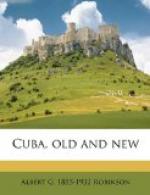“We, the delegates of the people of Cuba, having met in constitutional convention for the purpose of preparing and adopting the fundamental law of their organization as an independent and sovereign people, establishing a government capable of fulfilling its international obligations, maintaining public peace, ensuring liberty, justice, and promoting the general welfare, do hereby agree upon and adopt the following constitution, invoking the protection of the Almighty. Article I. The people of Cuba are hereby constituted a sovereign and independent State and adopt a republican form of government.” Thus opens the Constitution of the Republic of Cuba.
I recall an intensely dramatic moment connected with the closing phrase of the preamble. I have used a translation published by a distinguished Cuban. That phrase, in the original, is “invocando el favor de Dios,” perhaps more exactly translated as “invoking the favor (or blessing) of God.” When the Constitution had been drafted and broadly approved, it was submitted to the convention for suggestion of minor changes in verbiage. One of the oldest and most distinguished members of the body proposed that this phrase be left out. Another member, distinguished for his power as an orator and for his cynicism, in a speech of considerable length set forth his opinion that it made little difference whether it was included or excluded. There was no benefit in its inclusion, and no advantage in excluding it. It would hurt none and might please some to have it left in. Immediately across the semi-circle of desks, and facing these two speakers, sat Senor Pedro Llorente, a man of small stature, long, snow-white hair and beard, and a nervous and alert manner. At times, his nervous energy made him almost grotesque. At times, his absorbed earnestness made him, despite his stature, a figure of commanding dignity. Through the preceding addresses he waited with evident impatience. Obtaining recognition from the chairman, he rose and stood with upraised hand his voice tremulous with emotion, to protest against the proposed measure, declaring “as one not far from the close of life, that the body there assembled did not represent an atheistic people.” The motion to strike out was lost, and the invocation remains.




